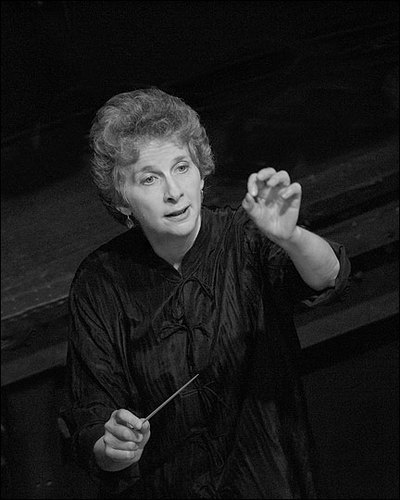Inspired soloists lift MOB’s mixed Bach opener

Before giving the downbeat to open Music of the Baroque’s 49th season, Jane Glover took a moment to dedicate the evening’s performance to Elliott Golub Saturday night at the Harris Theater. MOB’s founding concertmaster, who passed away in July, was on stage for the ensemble’s first concert in 1972 and served reliably and elegantly in that role through 2006. After retirement, as Glover affectionately noted, Golub continued to attend MOB rehearsals and concerts regularly.
One would have thought that extra bit of inspiration might have contributed an added degree of emotion and spiritual expression to the performance of Bach’s mighty Mass in B minor, a cornerstone of church music and, indeed, broader Western culture.
Yet despite some inspired moments, largely from the quartet and in the livelier choral passages, this Bach outing felt oddly uneven—giving us the moments of rejoicing but missing an essential spiritual dimension and too often failing to explore the depths of this extraordinary music.
Some but not all of this is likely due to the chorus working with a new hand. Longtime chorus director William Jon Gray retired at the end of last season, and MOB is fielding guest choral directors throughout this season. Andrew Megill, director of choral activities at the University of Illinois in Urbana, prepared the ensemble for these concerts.
The performance got off to a ragged start with several male choristers entering early on the first note of the opening “Kyrie.” The singing from the MOB Chorus was mostly polished after that, showing more of their customary cohesion and excellence.
Yet what was lacking was a greater range of expression to reflect the deeper and darker sections of the Latin text. Choral dynamics tended to center on a loud and unvaried forte; whenever the tempo slowed down, a generalized blandness prevailed. Even in such crucial sections as the “Et incarnatus est” and “Crucifuxus” there was little sense that the text meant anything more than singing the words—singing more quietly, the ensemble didn’t communicate much depth of emotion.
As is often the case with Glover leading these sacred cornerstones, the passages of rejoicing made sure impact—the “Gloria,” “Et resurrexit,” Sanctus” and “Osanna in excelsis,” all went with high-stepping vitality and exuberance, trumpets and timpani dominating the textures.
Less apparent was a sense of the essential devotional side of this intensely spiritual music. The deeper, more searching passages felt surfacey and undercharacterized. A kind of jaunty heartiness prevailed, as if we were hearing a Bach Orchestral Suite with Latin texts.
Fortunately, a fine quartet of vocal soloists compensated, supplying some of the deeper emotions lacking in the choral singing and direction.
Krisztina Szabó was first among equals of the quartet. The Canadian mezzo provided the performance’s high point late in the evening with her “Agnus Dei”—forlorn, melancholy yet hopeful, her deeply felt rendering plumbed a stark emotional depth. (Too bad Glover’s matter-of-fact accompaniment in that aria wasn’t shaded down to match the singer’s sensitivity.) Szabó’s inward “Qui sedes” was on the same high artistic level.
MOB regular Yulia Van Doren was superb throughout, her bright and agile soprano making the most of her solo opportunities and blending gratefully with Szabó in the “Christe eleison.”
The men had less to do but fulfilled their assignments with equal esteem. Baritone Tyler Duncan brought graceful, firmly focused singing to “Et in spiritum sanctum.” Jonas Hacker’s youthful tenor contrasted graciously with Van Doren in the “Domine Deus” duet and he brought poised sensitivity to the “Benedictus.”
Along with the soloists, the most consistent element of the performance was the stellar playing of the orchestra. In addition to their responsive ensemble, the front-desk players backed the singers’ arias with sensitive and characterful obbligato solos—notably concertmaster Gina DiBello, flutist Mary Stolper, oboist Anne Bach, and the especially nimble hornist Ote Carillo. The gleaming trumpet work of Barbara Butler, Charles Geyer and Channing Philbrick was thrilling and technically immaculate throughout.
The Mass in B Minor will be repeated 3 p.m. Sunday at the North Shore Center for the Performing Arts in Skokie. baroque.org; 312-551-1414
Posted in Performances


